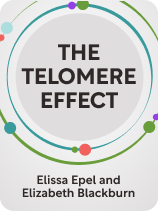

This article is an excerpt from the Shortform book guide to "The Telomere Effect" by Elissa Epel and Elizabeth Blackburn. Shortform has the world's best summaries and analyses of books you should be reading.
Like this article? Sign up for a free trial here.
What’s The Telomere Effect book about? Why do people suffer from old age?
In The Telomere Effect, Elizabeth Blackburn and Elissa Epel explain what telomeres are and their key role in aging. They also discuss how and why telomeres fray under persistent stress.
Read below for a brief The Telomere Effect book overview.
Overview of The Telomere Effect
Scientists have learned why people suffer the effects of old age, and it all comes down to DNA. In The Telomere Effect (2017), biochemist Elizabeth Blackburn and psychologist Elissa Epel explain that your telomeres, the tiny protective caps on your genetic material, dictate how fast you age. The authors say that longer telomeres keep your cells youthful for longer, and by extension grant you a longer and healthier life. This book offers insights into how everyday habits like sleep, diet, and exercise can help slow down aging by keeping these crucial little caps from wearing out too quickly.
When it comes to decoding the mysteries of aging, few can claim authority like Blackburn’s. A Nobel Laureate in Physiology or Medicine, she’s one of the pioneering scientists who isolated telomeres and discovered telomerase, an enzyme that replenishes these vital structures. Her groundbreaking work earned her a spot among Time‘s 100 Most Influential People in 2007. Today, she serves as a professor emerita at the University of California, San Francisco.
Epel is a health psychologist who has spent over two decades studying how daily stress and lifestyle choices affect the body’s most fundamental units: its cells. She’s a professor at the University of California, San Francisco and has co-authored several books about how simple habits can benefit people’s health in profound ways.
What Are Telomeres?
Blackburn and Epel begin by explaining that telomeres are repetitive DNA sequences coated in protein. They act as protective caps on the ends of your chromosomes—the parts of your cells that contain genetic information, made of many different genes coiled up like tightly wound threads. In this section, we’ll discuss the role of telomeres in our bodies and how they play into the aging process.
Telomeres Protect DNA During Cell Division
To help understand why telomeres are so important, the authors explain that telomeres protect your genetic information (your DNA) during cell division.
Your cells reproduce themselves by dividing, a process called mitosis. During mitosis, a cell copies its chromosomes and then splits into two new cells, with each cell getting one set of chromosomes. However, the cell loses small pieces of DNA from the ends of its chromosomes during this copying process, which is why the telomeres are necessary; you only lose bits of those repetitive, meaningless DNA sequences, instead of having your actual genes get damaged.
Furthermore, the authors explain, mitosis is a crucial biological process. This is because your cells naturally die over time, and they can also become damaged due to injury, illness, or environmental toxins like car exhaust. In fact, this is happening constantly; the reason you stay healthy in spite of all this harm is because your cells continually divide in order to replace the dead and damaged ones.
You Age Because Your Telomeres Get Shorter
Mitosis is necessary to keep you healthy, and telomeres allow your cells to undergo mitosis safely. However, Blackburn and Epel emphasize that your telomeres aren’t endless: Each time one of your cells divides, the telomeres inside that cell get a little bit shorter. When a cell’s telomeres get too short, that cell enters senescence, which means that it’s too old to keep reproducing.
Senescent cells are responsible for many of the harmful effects of aging. For instance, these worn-out cells constantly send out chemical signals that cause inflammation, leading to ailments like arthritis. As more and more senescent cells build up in your body, you start to experience the pains and frailty of old age.
Chronic Stress Damages Your Telomeres
Blackburn and Epel say that aside from physical factors (like injuries and pollutants), mental health disorders, stress, and negative thought patterns also cause your telomeres to shorten more quickly. In short, chronic stress makes you age faster.
This happens as a side effect of the “fight or flight response”: When you’re feeling stressed or upset, your body prepares you for action—your heart beats faster, your blood pressure rises, and you release the stress hormones cortisol and epinephrine. All of this gives you a burst of energy and strength so that you can overcome danger or escape from it. However, it also puts a great deal of strain on your body, meaning your cells have to divide more quickly in order to fix the damage.
Negative Thinking Creates Stress
Blackburn and Epel say that a great deal of preventable stress comes from getting yourself stuck in negative thought patterns. So, if you find yourself slipping into any of the following mental habits or perspectives, you might unintentionally be damaging your telomeres.
The authors’ solution to these negative thought patterns is resilient thinking, which we’ll discuss later.
Negative Thought Pattern #1: Pessimism
Blackburn and Epel say that pessimism—always expecting the worst possible thing to happen—is an unfortunately common and harmful way to think. For instance, perhaps you always anticipate failure or disaster as a form of self-protection; you might believe that it’s better to expect the worst than to be caught off-guard. However, this way of thinking leads to chronic stress, and therefore it’s most likely damaging your telomeres more than it’s protecting you.
A closely related thought pattern is cynicism: Cynicism is like pessimism, but it specifically means that you always expect the worst from other people. Cynical people are distrustful, quick to anger, and prone to overreactions. If you tend to be hostile toward others or assume that everyone else is untrustworthy, you’re probably stuck in cynical thought patterns—and putting yourself through a lot of unnecessary stress as a result.
Negative Thought Pattern #2: Rumination
Another harmful thought pattern the authors discuss is rumination: circular thinking where you go over the same stressful thoughts again and again, without reaching any solution. This thought pattern is common when, for instance, you find that you can’t stop thinking about some mistake you made or an embarrassing situation you found yourself in.
Unfortunately, trying to suppress those thoughts—burying them with constant distractions or pushing them away through sheer force of will—is equally stressful, and thus equally damaging to your telomeres.
Negative Thought Pattern #3: Worrying
Finally, Blackburn and Epel say that some people suffer more from the fear of stress than from actual stressful events—in other words, they worry too much.
Therefore, the authors urge you to consider the way you think about stress. If you tend to get anxious at the mere thought of difficulty or discomfort before anything stressful happens, odds are good that you’re worrying away your telomeres.
Social Isolation Creates Stress
Scientists have known for many years that social isolation causes people a great deal of stress—for instance, that’s why solitary confinement is a common punishment for prisoners. However, Blackburn and Epel say that the damaging effects of loneliness and rejection reach far beyond emotional distress, with scientific research spotlighting how these social ailments can meddle with the health of our telomeres. This occurs because everyone has an inherent need for love and connection with others—in fact, loneliness and rejection trigger the fight-or-flight response just as if you were in physical danger. As we’ve said before, this shortens your telomeres unusually quickly.
The authors add that this effect is especially noticeable among two vulnerable groups: children and minorities.
Children who are isolated from their peers undergo chronic stress during a crucial developmental period. In fact, studies have shown that children who experience this and other traumas (such as from abusive parents) have significantly shorter telomeres than children raised in healthy, nurturing environments. Furthermore, these shorter telomeres can lead to early-onset cardiovascular problems—in other words, these children could develop heart conditions that you’d normally expect in people who are middle-aged or older.
Researchers have observed a similar phenomenon in minorities, such as people of color, who often face discrimination from their peers and from society. The authors say that experiencing discrimination carries significant harm beyond hurting a person’s emotional well-being and sense of worth; it also generates chronic stress, which can lead to the negative health effects we’ve been discussing throughout this section.
Counterpoint: Short-Term Stress Builds Resilience
Blackburn and Epel say that while chronic stress causes you to age more quickly, short-term stress can actually make you more resilient and help protect your telomeres. This is because when you face manageable amounts of stress, your body responds by releasing hormones that help you adapt and cope effectively. This adaptive response, in turn, can strengthen your immune system and improve your overall health, helping to safeguard the length and integrity of your telomeres.
The Good News: Telomerase Rebuilds Telomeres
Blackburn and Epel say that most cells can divide about 50 times before entering senescence. This is called the Hayflick Limit, named for Leonard Hayflick, the biologist who discovered it. However, an enzyme called telomerase can rebuild telomeres, allowing cells to bypass the Hayflick Limit.
Unfortunately, much like your cells, your telomerase doesn’t keep working forever. Telomerase becomes less active as you get older, and eventually it can’t keep up with your cells anymore. This inevitably leads to senescence and the health issues that come with it.
The authors add that at this point, it might seem reasonable to artificially boost people’s telomerase levels to prevent or cure aging. However, they warn that this method could lead to totally unchecked cell division—in other words, cancer. Therefore, the best way to maximize your years of health is to boost your telomerase as much as you can using natural methods. This will help you avoid the telomerase overdose that triggers cancer.
Blackburn and Epel say that you can boost your telomerase levels and maintain your telomere health by living a wellness-focused lifestyle. In this section, we’ll examine a number of the authors’ suggestions for protecting your telomeres and, in turn, your health. These strategies include:
- Getting regular exercise
- Eating a healthy diet
- Developing good sleep habits
- Living in a clean environment
- Developing a more optimistic mindset
Telomerase Booster #1: Regular Exercise
Blackburn and Epel say that regular exercise lowers your blood pressure and minimizes your risk of stroke, diabetes, and other aging-related diseases like dementia. They add that you don’t need an intense workout regimen to see these benefits: A moderate exercise plan, such as going for a 45-minute walk or jog three times a week, goes a long way toward preserving your telomeres. However, the authors recommend aerobic endurance exercises or high-intensity interval training (HIIT) for maximum effect.
Telomerase Booster #2: Healthy Eating
When it comes to telomeres and cellular longevity, it’s your metabolic health that matters, not your weight. Blackburn and Epel say that common symptoms of poor metabolic health—like excess belly fat, abnormal cholesterol levels, high blood pressure, and insulin resistance—often go hand in hand with telomere damage. Therefore, the authors suggest that rather than fixating on losing weight through stressful methods like harsh diets, you should take a more holistic and sustainable approach to your metabolic health.
Protecting your metabolism (and therefore your telomeres) means adopting a prudent eating regimen that bolsters your overall well-being, instead of a short-term diet that just burns fat. A telomere-friendly diet relies heavily on fresh fruits and vegetables for nutrients, while incorporating whole grains for sustained energy. To round out this diet, the authors recommend using nuts and fish as healthy sources of protein.
Finally, the authors say that it’s crucial to reduce your sugar intake—refined sugars not only cause you to gain weight, they also contribute to metabolic conditions such as diabetes. For instance, most fruit juices and sodas deliver shocking amounts of sugar per glass. If you commonly drink these unhealthy beverages, try replacing them with flavored seltzer.
Telomerase Booster #3: Good Sleep Habits
Blackburn and Epel highlight the fact that a good night’s sleep is not a luxury, but rather a vital component in maintaining the health of your telomeres. Research suggests that individuals grappling with chronic sleep issues tend to have shorter telomeres compared to those who regularly get sufficient rest.
The authors recommend getting at least seven hours of sleep each night. However, they add that good sleep habits aren’t just about how long you sleep; how well you sleep matters too. For instance, if you’re constantly drifting in and out of sleep because noises outside keep waking you up, you—and your telomeres—won’t get the full benefit of a good night’s rest.
Telomerase Booster #4: A Healthy Environment
Finally, Blackburn and Epel say that environmental factors can have significant impacts on your telomeres, for better or worse. Here are a few suggestions to create a healthier environment:
Greenify your space. Fortifying your living space with greenery not only beautifies your surroundings, but also serves as a natural bulwark against airborne toxins like those found in car exhaust.
Go natural. Embracing all-natural alternatives to common household cleaners and cosmetics helps minimize your contact with dangerous substances like bleach and formaldehyde—remember, environmental toxins damage your telomeres and shorten your healthy years. For example, scrubbing with baking soda is a safe and effective way to clean everything from oven racks to toilets without the need for any toxic chemicals.
Find substitutes for plastic. Drinking from plastic bottles or microwaving meals in plastic containers exposes you to harmful chemicals like bisphenol A (BPA), thereby endangering your health and your telomeres. So, using containers made of glass or other non-plastic materials will help you stay healthier for longer.
Telomerase Booster #5: Optimism
Finally, Blackburn and Epel urge you to work toward a more optimistic mindset, especially when it comes to facing life’s challenges. Instead of dwelling on problems or treating them as insurmountable, optimists view difficulties as temporary hurdles on the path to their goals. They perceive challenges as opportunities for growth, rather than as threats. For instance, if you lose your job, it would be natural to fall into a pessimistic mindset of thinking that you’ll never find another job that good, never make as much money as you were making, or that you’ll lose your home before finding another job. However, an optimist would instead see this challenge as a chance to find an even better job and progress their career with a new employer.
However, the authors add, optimism doesn’t mean that you ignore negative feelings or experiences; it means you acknowledge them, but don’t let them define you or your future. This kind of mindset helps reduce stress and promotes mental well-being, which in turn keeps your cells strong and healthy for as long as possible.

———End of Preview———
Like what you just read? Read the rest of the world's best book summary and analysis of Elissa Epel and Elizabeth Blackburn's "The Telomere Effect" at Shortform.
Here's what you'll find in our full The Telomere Effect summary:
- Why people suffer the effects of old age
- How negative thinking and social isolation speed up the aging process
- Specific habits you can adopt to stay young longer






